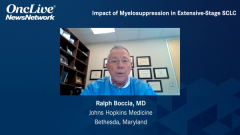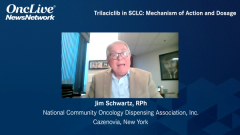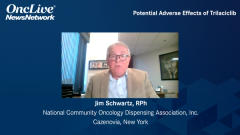
Impact of Myelosuppression in Extensive-Stage SCLC
Ralph Boccia, MD, discusses myelosuppression with chemotherapy and highlights its impact on treatment outcomes and patient quality of life.
Ralph Boccia, MD: Extensive small-cell lung cancer is still treated with combination chemotherapy with and without immuno-oncology drugs. That means that, unfortunately, we still face significant difficulty with myelosuppression.
Myelosuppression is still a problem in the sense that it sometimes affects our ability to give effective drugs, treat the cancers and provide symptomatic relief from those cancers. That said, with the development of neutropenia, patients can end up getting infections and in the hospital. Sometimes they end up in the hospital and then going to skilled nursing facilities, which puts them off schedule. Sometimes they never get back on schedule, and the effect of the treatment was abrogated by the neutropenic febrile event that occurred.
In addition to neutropenia, we face anemia. Although we’ve effectively had the erythrocyte-stimulating proteins for many years, they are not completely effective. The development of anemia has become a problem. The use of these drugs has become problematic, has resulted in a black-box warning, and could potentially affect the outcomes of treatments in patients with cancer. The use of ESAs [erythropoiesis-stimulating agents] has not been a perfect solution in any way, shape, or form. The same goes with thrombocytopenia in the sense that it can also affect your ability to give full doses, to stay on schedule or on time, and it may at some point require the use of transfusions. This means that—at the least—patients end up at infusion centers and have to spend the time and the money and endure the toxicity that these can provide. Overall quality of life can be affected. The efficacy of the therapy can be affected, and the ability to administer the drugs on schedule and on time is often affected.
Transcript Edited for Clarity











































